
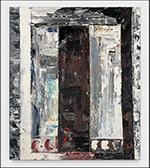
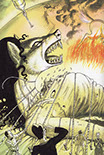
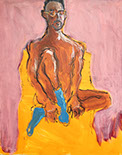

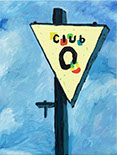
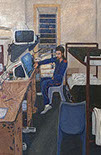
Alieś Puškin
1965-2023
by Chrysalis Magazine and the New Art Examiner
August 6, 2023, the internationally known Belarusian performance artist and political provocateur Alieś Puškin would have turned 58 years old. Instead, it was announced in July that the artist had died under “unexplained circumstances” while in government custody. The cause, according to human rights activists, was a combination of poor prison conditions and delayed medical treatment. He was one of 1488 individuals—133 of them members of the cultural elite--currently in imprisoned by the Lukashenko regime for their political views, a number that continues to grow. In cooperation with Chrysalis Magazine, a Belarusian contemporary art publication, the New Art Examiner commemorates the life, creativity and early death of this important artist.
Alieś Puškin was born on August 6, 1965, in Bobsk, a small village near Minsk, that had been home to his family for five generations, and where the. artist himself lived until his arrest in 2021.
Pushkin enrolled in 1978 at the Republican Boarding School of Music and Fine Arts and later studied Monumental and Decorative Art at the Belarusian State Theatre and Art Institute (now Belarusian State Academy of Arts), but he was conscripted and sent to Afghanistan. Far from a model soldier, he spent a total of 28 days of his short military career in detention for dissident activities, including 10 days for keeping a diary in the (then illegal) Belarusian language.
Upon his return home, Puškin continued his studies and held his first performance in 1988 on the occasion of the 71st anniversary of the Belorussian Peoples’ Republic. He described the performance in his interview for Chrysalis Mag in 2020:
“During [my] fourth year at the university, I’d been organizing happenings on the avenue, adorned with posters and megaphones. That is when those performances, walking exhibitions, started… I created 12 posters, invited friends, and together we marched to the House of Press, where we, a total of 36 people, were arrested. This resulted in a five-year probationary term, with two years of probation. But what posters they were!”
In this instance, as in other of Pushkin’s performances, the repressive official reaction of the authorities was understood to be part of the performance.
Gift to the President
Puškin launched his most memorable—and provocative—performance on July 1999, on the fifth anniversary of Lukashenka’s rule. In the village of Bobr, the artist loaded an old cart with manure and placed several items on top: a poster that read "Aliaksandar Lukašenka’s with the people," a sign saying "For five years of work," pre-denomination Belarusian money, handcuffs, and the constitution with amendments expanding Lukašenka’s powers. With the cart of manure, he headed to the President's residence in the center of Minsk on a minibus. When confronted by security, the performer then overturned the cart onto the pavement, placed a portrait of Lukašenka’s on top, and pierced it with a pitchfork. Soon, AMAP (Special Purpose Police Unit) officers arrived and arrested the artist.
The court sentenced Alieś Puškin to two years of conditional imprisonment.
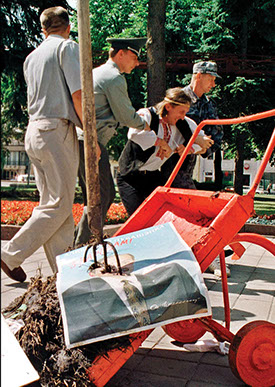
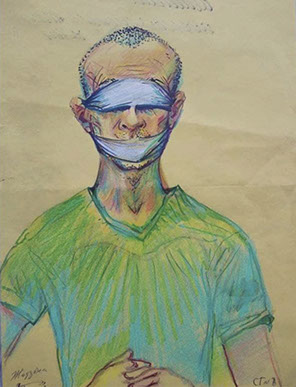
(Left) Puškin confronts riot police at the 2020 protest in Belarus against fraudulent elections.
(Right) Blue Man, undated image from smuggled prison sketchbook. Photos: Chrysalis Magazine.
From that action until the end of his life, Alieś Puškin continued to engage in performance art and to routinely antagonize the increasingly repressive Belarusian authorities.
In 2020, during the massive wave of protests in Belarus for fair elections, Puškin held his own provocation. He was arrested during his street performance and taken to Akriescina prison, where he endured brutal beatings throughout the night. After his release from the prison, he took a photograph of his injuries, which later appeared at protests and international exhibitions.
After the start of the Belarusian protests in 2020, Puškin's performances caused considerable stir in the arts community and beyond. Other activists quoted and reinterpreted it, and the artist himself recreated his work at the major exhibition "Everyday" held in Kyiv in 2021. Despite knowing about the criminal case already filed against him in Belarus, Puškin decided to return to his homeland.
The artist was subsequently detained in the village of Žyličy, in the church where he was working on restoration and sentenced to 5 years in prison on trumped up charges of disrespect to state symbols (Art. 370 of the Criminal Code) and incitement of hatred (part 3 of Art. 130 of the Criminal Code).
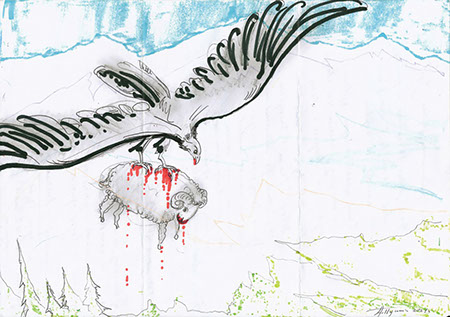
Alieś Puškin, Galava, undated image from smuggled prison sketchbook. Photo: Chrysalis Magazine.
During his detention in solitary confinement, Puškin continued to draw and to smuggle the images out of prison. Some of his drawings were preserved thanks to human rights activists and can now be viewed on the website of the human rights center "Viasna" (https://prisonart.spring96.org/about-us). There, one can find works not only by Alieś Puškin but also by other political prisoners from Belarus.
Though one of the most prominent, Aleś Puškin was far from the only artist to lose his life fighting for freedom of speech and in protest to the illegal 2020 elections. Brutal repression of Belarusian cultural figures and their allies continues. On July 26, 2023 a verdict was handed down against activist, historian, and former director of the "Center of City Life," Paval Mažejka, and lawyer Julija Jurhilievič, who had defended Alieś Puškin in court. The Belarusian court has sentenced Mažejka and Jurhilievič to 6 years in prison.